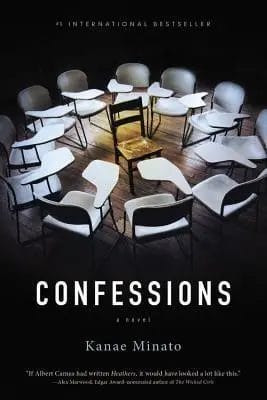

Confessions
By Kanae Minato
Her pupils killed her daughter.
Now, she will have her revenge.
After calling off her engagement in wake of a tragic revelation, Yuko Moriguchi had nothing to live for except her only child, four-year-old Manami. Now, following an accident on the grounds of the middle school where she teaches, Yuko has given up and tendered her resignation.
But first she has one last lecture to deliver. She tells a story that upends everything her students ever thought they knew about two of their peers, and sets in motion a maniacal plot for revenge.
Narrated in alternating voices, with twists you’ll never see coming, Confessions explores the limits of punishment, despair, and tragic love, culminating in a harrowing confrontation between teacher and student that will place the occupants of an entire school in danger. You’ll never look at a classroom the same way again.
My thoughts:
This book was unlike anything I’ve ever read, and even though I finished it a few days ago, I still can’t figure out how I feel about it. I liked it was different, and the ending had a very nice twist, but I wasn’t as in love with it as some folks I follow on Bookstagram, though I can see why they liked it.
Before I go on, I will warn you that there is a slight spoiler toward the end of the review. It’s revealed in the first chapter, so it’s not a major spoiler–it is important to the plot, though. I’ll highlight/announce it below so you can stop reading if you should want to go in blind.
The synopsis reads as though the entire book takes place in a single day in the classroom of a middle school teacher – Yuko Moriguchi–whose 4-year-old daughter Manami died at the hands of two of Yuko’s students (or at least that is the way I interpreted it). That is not the case. In fact, it’s only the first chapter that takes place in Yuko’s classroom. The other chapters focus on different viewpoints of two characters who were responsible for Manami’s death and then the class president and the mother of one of those responsible, ending with a final chapter from Yuko’s perspective.
I will admit that while reading the first chapter, I wasn’t sure if this book was going to be for me. It reads as if Yuko is addressing her students directly and we, the reader, are one of those students. This was really effective because it makes you feel as though you are sitting in the classroom being lectured–it totally sets the tone. The problem I had while reading it is that I kept thinking, “I don’t think I can read an entire book like this” only because that first chapter is filled with a lot of telling. There’s very little dialogue–it’s like you’re being talked at. If this doesn’t sound like your jam–I get it, but I’m happy to report it’s only the first and last chapters that read this way. The others–though told from the first-person POV read more like a book than someone talking at you.
The author also does a great job of slowly showing us the true personalities of the characters, and also of changing your opinion of characters as you learn more about them from other narrator’s points of view. One of the students responsible for Manami’s death is painted as a psycho from Yuko’s point of view, but you feel sorry for them in the second chapter and question the reliability of their accomplice and wonder if maybe they were an okay person who was just in the wrong place at the wrong time, but then when you finally hear the story from their perspective you realize that no–they really were pretty fucked up, but you understood why.
The students did a horrible thing–and it’s not to be forgiven or underplayed – but the author shows them as complex individuals who were up against some pretty shitty environmental factors that led them to this. Sure, on one hand you could say maybe one of them was just a spoiled brat and the other a bully who was handed one too many bad cards, but at the end of the day, a four-year-old girl was killed and her mama wants the kids to pay–and they do, though it’s not in the way you might think.
Don’t worry–I won’t give away the ending, but I will say it is satisfying and has a nice little twist. While I never fully connected with it as a whole, I got through it pretty quickly and it was definitely different from anything I’ve read – so kudos to the author for that.
Here comes the slight spoiler:
One issue I had with the book (and issue sounds really strong) but while talking to the students about Manami’s death and why she is leaving, she tells them she has tainted the two suspected killers’ milk that they’d drunk that day with HIV. She tells the class that her ex-husband and Manami’s father had AIDS (both of them were spared) and that she had drawn some of his blood and injected it into the milk to potentially infect the students who had killed her daughter so now they had to live out their days knowing that they were numbered (or something to that effect).
Now, on one hand, I can see where you telling a middle schooler that you’d done this to them–they’re likely to believe you and yes, the emotional turmoil that might cause could be excruciating. At the same time, it felt like spreading misinformation. I get the book was first published in Japan in 2009 and in the last 14 years we have made a ton of progress, but still it just sat weird with me. It was a little uncomfortable.
That said, it was still a pretty interesting read. I didn’t love it, and it didn’t blow me away.
Genre(s):
Other Bookish Tags:













